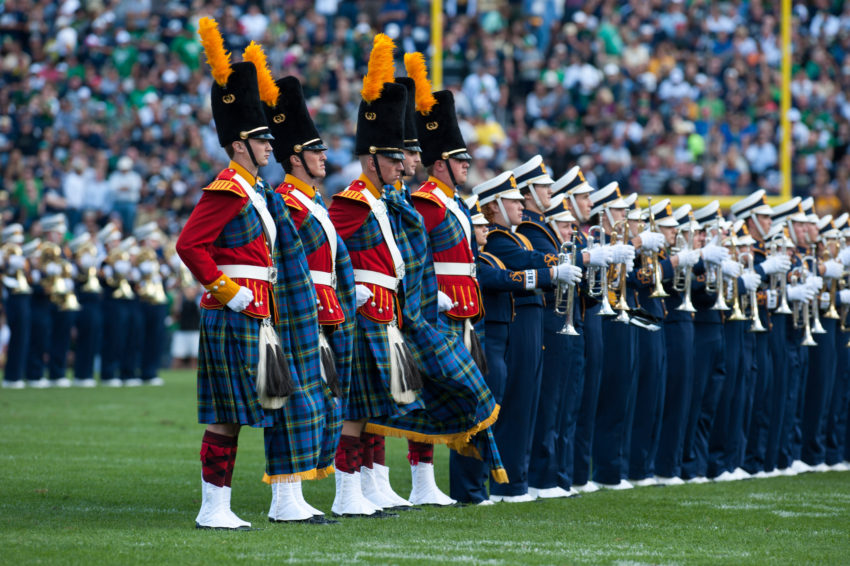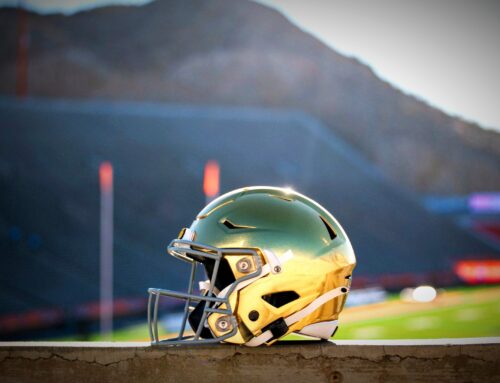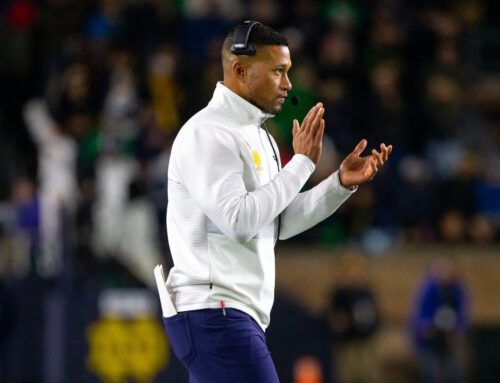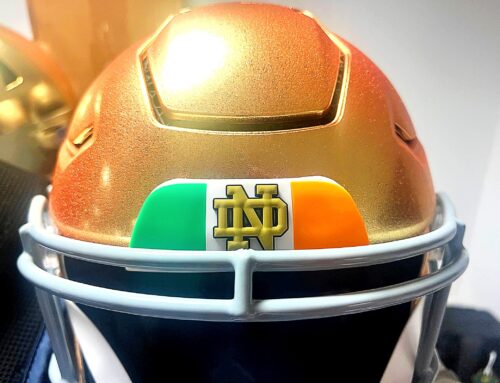A few years ago the NCAA was looked at with scorn but also labeled as a tone-deaf organization unable to cope with the changes of the modern world. While the NCAA is still derided in most corners they are beginning to turn the wheels of progress, particularly when it comes to college football recruiting.
In the upcoming April voting it is expected that a ban on satellite camps will pass as well as the introduction of official visits from April to June in the junior year of a recruit’s high school career. Right now, recruits cannot take official visits (paid for by the school) until September 1st of their senior year.
Each of these rule changes has been met with overwhelming support from football programs and the public.
The NCAA is also voting on an early signing period for college football and that too is expected to pass. The new rule would adopt the JUCO signing period for all recruits whereby anyone could bind themselves to a school in the mid-December 3-day period.
An early signing period has been gaining momentum for several years and it’s usually viewed as a positive (to be fair it’s worked well for other sports) but will that be the case in college football?
Let’s investigate.
Positives
The vast majority of the benefit of an early signing period will come to the recruits who, for a lack of a better term, have their stuff in order. They’ve done their homework, taken the appropriate visits, and know for certain they are ready to sign.
Due to the aisle Notre Dame shops down (to use Brian Kelly’s term) these types of recruits are fairly common for the Irish. Thus, the early signing period is bound to be pretty popular among Notre Dame fans.
There are a lot of recruits out there who want to shut things down, do not want to deal with any more drama, and are more than ready to sign. Also, there seems to be a rising current to de-emphasize the the madness of National Signing Day and this could be a way to lessen the mania, or at least split it up.
Another benefit for programs would be to “lock in” their class 6 weeks earlier and have more opportunities to focus on remaining big fish or move resources to building the next recruiting class. Either way, you can see why coaching staffs would be happy to stop recruiting a portion of a class earlier than usual.
An early signing period would also force some schools to “show their hand” and allow recruits to see if they truly held a scholarship offer, even if committed. In a gray shirt situation, for example, it’s better if a recruit knows about the scholarship being delayed (and that’s putting it nicely isn’t it?) with 6 weeks until National Signing Day instead of as little as a week before the music stops.
Negatives
The issue of coaching turnover has positives and negatives but probably more on the latter side for the long-term. In situations where a coach is fired relatively late in the process there’d already be a group of freshmen signed and a new coach wouldn’t be able to throw away their offers in the weeks leading up to NSD.
However, there’s already fear building about how the early signing period will affect when coaches get fired, particularly among the blue-blood programs. If you’re going with a different philosophy or scheme an AD might be willing to force a firing earlier than usual for the express purpose of ditching commits and not allowing certain players to sign during the early period. Maybe this is technically “better” since the dropped players will still have 6 weeks to find a home but it’s not really solving anything is it?
You also have to factor how stable an early signing period is going to be, regardless of the new coaches’ priorities, when there are so many staff changes in a short amount of time. It will be difficult to ask some recruits to sign when their school’s staff was just blown up 10 days earlier. Of course, the players don’t have to sign and have that right. But we could see the opposite of the above, AD’s might want to fire and hire as close to the December signing period as possible to keep their recruiting class in tact.
Doesn’t this early period hurt the academic schools, as well? Stanford sometimes waits until well into January to decide if a student is admitted and what if a bunch of their targets get cold feet and sign in December elsewhere? We’ve also seen Notre Dame take chances on some academically risky students and moving up the process certainly isn’t going to help the Irish make a more informed choice. I wouldn’t want to be part of a conversation where a commit won’t be able to sign because it’s too early due to an academic issue.
Another negative is the pressure to sign early that will inevitably come from many programs. For certain, this wouldn’t be as pronounced like it would be for a late June (after junior years, so 8 months before National Signing Day) signing period. This far earlier period has been a part of recent rules changes conversations but remains intensely unpopular for good reason.
A June signing period would be a disaster for hundreds of recruits and most of the top programs have made it known they want nothing to do with signing some of their recruits before they’ve even played their senior year, and if we’re completely honest, before they’ve possibly suffered a career-ending injury.
Signing in December—where at least you’ve gathered a major data point after a recruits senior season—is much better but that doesn’t mean problems won’t arise.
Truthfully, there are far too many recruits who do not have the correct support to be making a decision at an earlier date. Will a signing period 6 weeks earlier really be that big of a deal? Perhaps not, but it opens the door to disgruntlement.
Remember, not that long ago recruiting stretched right up until fall camp of the first year on campus. I’m not sure moving the process up is a great idea—although allowing official visits earlier helps things out. I’m just not sure enough recruits, and the industry that feeds the beast, has properly adapted to an earlier signing period.
Bottom line, this will likely come down to how the elite programs deal with an early signing period and how well elite recruits deal with the possibility of signing earlier. The more problems at the top of the food chain the more that trickles down to the 3-stars who are sometimes waiting until well into January to grab a USC offer over a Utah offer or a Florida State offer over a Penn State offer.
Verdict
If I had the ability I would vote against an early signing period for one simple reason: It will introduce problems that didn’t exist before while alleviating very few current problems.
The types of recruits who are truly ready to sign early don’t need to sign early. Why create a rule for someone who wasn’t going to be any trouble and will sign in February anyway?
The excuse that a lot of recruits “don’t want to put up with the media” isn’t convincing enough to me. If you really don’t want to take part in that circus you can take steps to remove yourself from it and the kids who are typically ready to sign early often take those measures. Why create a new rule for them again? Additionally, many of these recruits are early enrollees anyway.
Plus, when looking at it through 6 weeks that’s an important extra 42 days for recruits who are still being offered and sorting through where they fit best. I tend to think that takes precedence over kids who would have to put up with the circus for 6 more weeks. Being annoyed by texts doesn’t compare to making such an important decision as a college choice.
An interesting path for the future is looking at Alabama bringing in a dozen early enrollees this month, many of them blue-chip prospects. If a culture develops of graduating high school early as the norm for college football players then an early signing period becomes easier to swallow. Then again, I’d love to see the transcripts for some of these athletes because I bet there’s a lot of massaging going on in regards to graduation.
I’m also curious to see how prevalent it becomes for players to get out of their Letter of Intent should they sign early. An early signing period works better for other sports because A) There’s fewer players overall by a wide margin B) Football covers the most diverse backgrounds C) Football is the dirtiest sport, or at least equal to college basketball.
You just know Notre Dame is going to early sign the #1 player in the country who just happens to play safety and by early March his aunt’s cousin will get sick and the player will get a waiver from the NCAA to transfer to his hometown team.
I exaggerate (Notre Dame would never sign the #1 overall recruit if he’s a safety) but you wonder how pushing forward the decision making and earlier pressure to sign will exacerbate the shenanigans of trying to get out of Letters of Intent. That’s a long 6 months of waiting if you’re reporting during the summer.





I agree on most of this, but I do think you’re underselling how easy it is for recruits to stop getting bothered during the process. Many start out thinking that it’s going to be fun; you’ve got the biggest coaches in the country courting you, their fans are sending you messages telling you how much they want you to come, and Rivals is publishing interviews with you for the world to see.
A few months later, those same coaches are courting a player at your position they told you they had no interest in. Other coaches are calling you daily to badmouth the other programs recruiting you. Fans on social media are telling you how terrible you are for considering their rival (or even using racial slurs). Rivals won’t stop calling/texting you daily trying to figure out which school is 1% ahead of the others for you.
A lot of kids think it’s going to be a great time, and just a few months in, they have a tough time getting away from it if they really want to. For them, the earlier they can sign, the better.
I think you’re right about the hassle factor being a bigger issue and this helping to allay that. I also see the “law of unintended consequences” having some unusual, detrimental result develop from this, but who knows what that will be until the rule exists for a few years.
Ultimately, meh. I can’t get excited about this one way or the other.
Maybe, although I think you’re exaggerating things for the average recruit, but a lot of those problems revolve around the level of maturity and support for a recruit.
Kids should be shutting it down primarily because they are completely comfortable with their choice. The ones that aren’t completely comfortable or ready–the ones more likely to be harassed–shouldn’t decide earlier just so they can stop being harassed.
We should create more mature athletes and more informed decisions, not an earlier way out just so the madness stops.
I didn’t realize the early signing period was only 6 weeks early. Doesn’t seem worth it. If it was like October, or even right at the end of HS football season (early Nov?), I would be all for it.
I don’t think your conclusion adequately considers the grey-shirt (or worse, pulled scholarship) scenario. That is the primary positive of the early signing day and giving recruits six weeks extra notice that the school after their services has stabbed them in the back is a solid check mark in “problems solved”.
This is a great point…similar to the “early match” for competitive residencies in medicine. Those that don’t get what they want then have time to scramble for a position anywhere else.
That said, I would think the player would know his position with a scholarship no differently based on an early signing period. If the school is lukewarm on using a scholarship, they still won’t know the player’s position until after the main signing day.
True, but what percent of total scholarships does this happen? It’s under 1% I would think.
If no other issues come up and there was more time for greyshirts and pulled scholarships I’d agree.
It’s definitely rare, the problem is that for the kids that it does happen to it can be pretty catastrophic. These aren’t the blue chip kids who trade a trip to Alabama for a trip to LSU, they’re the ones who worked with their coaches to shop their game tape around to AAC teams, so these are the kids who go from free college to not admitted to college or can’t afford to attend college or lost their entire support structure for college.
I don’t know how you’d do it, but with that in mind I’d like some kind of blended system where once colleges go past a certain point with a kid they can’t pull the rug out from under them, but I don’t know how that would be set up since obviously you have to offer more than twenty-whatever kids to fill your class since some of them will go elsewhere.
I don’t have a great answer to this one. You’ve convinced me that the proposed solution isn’t great, but neither is the status quo.
I wonder how folks feel about eliminating National Signing Day altogether? Allow anyone to sign beginning on September 1st of their senior year?
Bold idea. I don’t like that one either, though.
The problem is that Sept 1st would become the new signing day, simply shifting everything up to that day.
This is true.
Another idea is to push NSD back to the late spring. But that seems incompatible with the way admissions works these days.
good point by spider-man about if it were moved to 9/1. As NSD is now, you don’t have to sign on NSD, it is just the earliest you can. I am actually surprised more kids don’t wait until later.
But, as discussed in the article, I bet a lot more coaches and players would be wary of signing THAT early. So in order to do that, what about moving it up even further, to say Jan 1 of JR year. Basically the only kids who would sign then are ones who grew up dying to go to that school. Then it would basically become that your commitment, if the coach was willing to accept it, would actually be the end of your recruitment.
Maybe add in some caveats for the student athletes that is a HC leaves, you are released from you LOI. Maybe some other stipulations.
Thoughts?